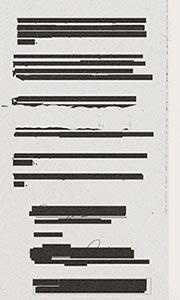How to Revoke a Will
We show you how to revoke a Will in a way that cannot be contested and also supply you with a downloadable Revocation of Will format which you can use as a template.
The intention to revoke must be clearly expressed and the act of revoking a will must be done whilst a person has testamentary capacity. Testamentary capacity has much less stringent requirements and must not be confused with the lack of mental capacity.

How to Revoke a Will in 3 Different Ways
- Express revocation of a Will. This can be done by executing a valid Will, Codicil to Will, antenuptial contract with testamentary provisions that contradict the provision(s) of an existing will or by executing a simple revocation of Will document.
- Revocation by a physical act with the combined intention of revoking the Will. A Will can be obliterated, burned, torn etc.
- Revocation by operation of law e.g. marriage/civil partnership or divorce.
1. Express Revocation of a Will
Most often revocation would be by an explicit revocatory clause in a NEW last will and testament. An example of such a clause would read as:
"I hereby declare that this is my last Will and Testament and that I hereby revoke, cancel and annul all Wills and Codicils previously made by me either jointly or severally."
It is important to note that your new Will must be duly executed (i.e. legally valid) in order to revoke any previous Wills or Codicils. This would then make it extremely difficult for beneficiaries under your previous Will, who were omitted subsequently, to challenge your Will.
Take a look at our step-by-step instructions on How to Write a Will as well as the variety of free Will forms that are available to help you draft your document.
Destroy any copies of the old Will once your new Will has been executed so there can be no mistaking the old one as being a current Will.
Revocation of Will document: A testator can issue a revocation that contains no other testamentary provisions. The sole purpose would be to revoke a last Will and Testament and thereby publish notice of the revocation.
Sidebar: You do not publicly publish your document anywhere. In legal terms it simply means that you inform your witnesses about the nature of your document i.e. you state that you intend the document to be your Will or Codicil which they are a witness to.
Revocation of a Will can be done by a Codicil that has been legally executed as per the formal requirements in the jurisdiction and the intention to revoke must be clearly expressed. This shall have immediate effect and not upon the death of the testator only, as is the case with a last Will.
Perhaps the testator has an urgent need to revoke his Last Will and may not have the opportunity to draft and execute a new Will as yet. The testator needs to be cognisant that he will die intestate (without a Will) unless he executes a new Will before his death.
Here we show how a testator can cancel a whole Will by revocation as per our printable free template below. Or follow the links to download a fillable PDF or Word template.
Revocation of Will Format
![]()
REVOCATION of LAST WILL AND TESTAMENT and CODICILS
of
____________________________________
(Full Legal Names)
____________________________________
(Identification / Social Security Number/s)
____________________________________
(Address)
1. Declaration
I declare that I hereby revoke, cancel and annul all Wills and Codicils previously made by me either jointly or severally. I declare that I am of legal age and of sound mind and that this revocation expresses my wishes without undue influence or duress.
2. Affirmation of Intestacy
I affirm that my property both real and personal shall pass under the laws of intestacy of ________________ (State/Province/Country) until such time that I duly execute another Last Will and Testament.
Executed on this _________________ day of _________________20_____
at this location _______________________________________
SIGNED: _______________________________
in the presence of the undersigned witnesses:
Declaration of Witnesses
As witnesses we declare that we are of sound mind and of legal age to be called upon as witnesses and that to the best of our knowledge ____________________, the creator of this Revocation is of legal age, appears to be of sound mind and signed this Revocation willingly and free of undue influence or duress. We declare that he / she signed this Revocation in our presence as we then signed as witnesses in his / her presence and in the presence of each other witness, all being present at the same time.
Under penalty of perjury we declare these statements to be true and correct on this_____ day of _________________ 20 __ at this location ________________________________.
Witness 1.
Name: _________________________ Address: _________________________
Signature: _________________________
Witness 2.
Name: _________________________ Address: _________________________
Signature: _________________________
Acknowledgement
This document was sworn to and acknowledged before me on this
______day of ____________________20__
by ________________________(Testator's full legal names) who is personally known to me or who has provided identification in the form of _________________.
Signature of Notary Public ______________________
Full legal names ______________________________
My commission expires ________________________
State of ________________________ County of ______________________
In some jurisdictions the Revocation of a Will may be attested to by a Commissioner of Oaths as follows:
I, (full legal names) of (address) in my capacity as Commissioner of Oaths certify that the testator named ______________ is personally known to me or who has provided identification in the form of _________________ and that the accompanying is a Revocation of the Last Will and Testament of the testator.
Signature _________________ Capacity _________________
Place ___________ Date __________
Notes to the above Revocation of Will Format:
- Having an affirmation of intestacy included in a revocation of a Will, can serve to prove that a testator understood the possible consequences of revoking all previous Wills without executing a new Will at the same time. It was therefore not done erroneously or under misconception, but with full intent to do so.
- The declaration on our revocation of a Will template revokes all Wills and Codicils previously made by the testator. If you've made only one Will, you can alter the first sentence to reference a Will that was made on a specific date to read as follows:
"I declare that I hereby revoke, cancel and annul the Will that was duly executed by me on _________."
2. Revocation of a Will by a Physical Act

How to revoke a will by destruction - this may mean physically destroying the Will such as burning, cutting or tearing the document, with the intention to revoke.
Destruction of a Will may also be symbolic where the testator has clearly indicated his intention to revoke.
So the document may still physically exist, but it may have been defaced by writing a word such as "Cancel" across the document, obliterating his signature or cutting it out, drawing lines through the Will, etc.
The above would be seen in context to establish validity, for example:
The testator had the Will in his sole possession and effected the destruction.
vs
The Will was held by a third party and was found damaged.
If you therefore intend to revoke or amend a Will, you should do so in a way that clearly indicates your intention to do so.
Note: A Will may also be lost or destroyed accidentally which does not mean it was revoked. If there is no copy, then evidence from another source may be submitted as to the contents of the Will.
Partial Revocation of a Will - Amendment to a Will

An example of this is where a portion or provision in a Will is deleted, erased, torn out, obliterated and no new provision is stipulated.
However, it could be contested that this partial revocation was not done by the testator. For example, a person in possession of a will may obliterate express bequest(s) to a sibling in order to inherit the entire estate.
The testator may want to delete a part of his Will and insert something in its stead. This amounts to a partial revocation AND an amendment to his Will.
It is not advisable to revoke a provision in a Will by tearing out that section of the Will. If the missing content can be proven (such as by an earlier copy of the Will) the provision shall remain binding.
In a Codicil to Will this can be better done as follows:
"Clause _______ shall be deleted in its entirety and replaced by the following clause: ____________"
Or
"Section ______ contains the following sentence '__________________' which shall be revoked and replaced with this wording: __________________"
Important Note: Handwritten interlineation amendments to a Will may not be legally valid in some jurisdictions!
A testator is best advised to execute a Codicil to Will to clearly express any amendments or to revoke the entire Will and execute a new last Will and Testament with a view to avoid confusion or conflict down the line.
Note: Our instructions on How to Make a Codicil / Addendum to Will with free Codicil to Will templates can guide you through making your own Codicil to Will.
How to Revoke a Will through Implied Revocation of a Will - Tacit Revocation of a Will
Revocation can be tacit by executing a subsequent Will even if there isn't an explicit revocatory clause.
A provision in a Codicil can contradict an earlier provision in a Will or Codicil and although it may not expressly revoke the earlier provision, it will be revoked tacitly. The latter will revoke the earlier by implication.
Implied revocation can also occur where assets bequeathed in the Will have been alienated, i.e. they are not in the estate's possession at the time of death.
For example: There may be a provision in the Will bequeathing jewelry (which was voluntarily given away to someone else) or a painting (which was sold earlier by the testator).
These provisions will be regarded as being revoked.
Note: If there are several Wills left behind and the last Will does not expressly revoke earlier Wills, then the Wills must be read and reconciled together as far as possible. Provided the latest Will is legally valid, it will revoke conflicting provisions of earlier Wills by implication.
It can become a legal quagmire to resolve and cause unnecessary delays along with inflated legal costs in executing your Will.
Revocation of International Wills
If your last Will states that it revokes ALL other Wills and Codicils, it will also revoke any foreign Wills. So if you have separate Wills dealing with property in other countries, you must modify your revocation clause to read:
"I declare that I hereby revoke, cancel and annul all Wills and Codicils previously made by me either jointly or severally insofar as it relates to any part of my estate in [Country] only."

Revocation by Operation of Law
Note that the following is not uniform across all jurisdictions!
Marriage or a civil partnership may revoke a Will, unless the Will was made in anticipation of the marriage.
Does divorce revoke a will?
In one jurisdiction divorce or annulment of marriage may automatically revoke all provisions related to a former spouse. In another, revocation may only happen if the testator dies within a certain time period of the divorce.
In either event, the provisions related to family members of the former spouse are not affected. Similarly a life policy naming the former spouse as beneficiary will not be affected by divorce.
Divorce will not have the effect of revoking a Will in the UK but any bequests to the spouse or civil partner will fail.
This illustrates how important it is to update your Will - either by executing a new Will or by Codicil to Will - when there is a change in family situations.
Is a Lost Will an Assumption of Revocation?
If a Will is lost it does not necessarily mean it cannot be probated. The following will be considered by the court:
- The witnesses to the Will can provide testimony that it was duly executed, and if applicable, that it included a revocation clause of previous Wills and Codicils;
- There must be a valid explanation for its non-existence, which is not because the testator intended to revoke it;
- There must be witnesses to the contents or a true copy of the Will must be submitted.
Note though that the requirements for proving the contents of a lost Will are stringent and varied across jurisdictions.
We've shown you how to revoke a Will in a number of ways with arguably the safest and simplest option being the execution of a valid new Will.
Legally reviewed by: MD Sawyer (LLM)
February 2022
You are here:




